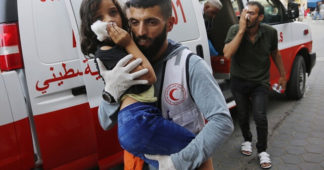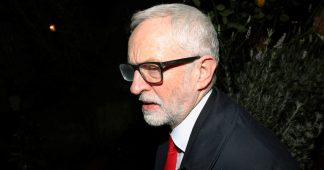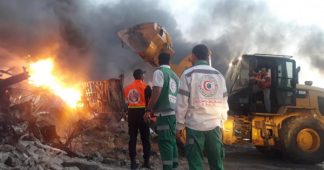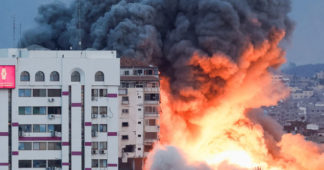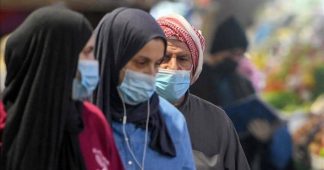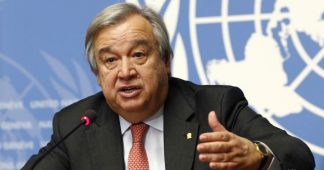By Antoine Larrache
Dec 12, 2023
L.S., a Palestinian activist, talks about what’s happening in Palestine.
Antoine Larrache: Do you have any information on what is happening today in Gaza, and on the state of the Palestinian resistance?
L. S.: Apart from what we hear in the media, all the information that is disseminated, what worries me a lot is the state of mind of the people, all the destruction they are facing. We talk about the number of deaths, but those are just numbers. We don’t talk about the human stories behind them. We talk about children, but we don’t know how many, we don’t care about what will become of those who have lost their whole family. Families moving several times, from one place to another, represents great instability.
There is also the destruction of Gaza and its infrastructure. We’ve never seen these kinds of photos and images in previous wars: it’s really a war waged not just to wipe out the population, but also to raze the territory to the ground. That’s what’s most worrying, along with the political project behind it.
The mental and psychological state of the victims is perhaps even more serious than their physical state. Because in all wars, in all displacements of population, we know the humanitarian crisis, the destruction of homes, refuges, massacres, etc. But this is not a war. But this is not a conventional war: it’s a colonial war, and Israel is waging it before the eyes of the whole world, the whole of the West and the Arab countries. We are dying in silence.
What is also worrying is what will happen afterwards: once the massacres have stopped, how will the people get their lives back, their families, scattered as they are, back to their homes? It’s not just the human aspect, it’s also the social aspect that’s at stake. That’s what Israel wants, and is doing with this war: not just crushing and razing the territory of Gaza, massacring as many people as possible, but also destroying Palestinian society.
There are no more workplaces, the schools have been destroyed, the hospitals too, and so on. So there will be no more life. Everything will have to be rebuilt if Israel has not invaded and carried through its political plan to drive out the population, build settlements and so on.
Do you think their aim is to destroy the Gaza Strip piece by piece and colonize it?
I think they’re going to expand the settlements. They may not go into the most densely populated areas, they may have other objectives. It’s also possible that Israel’s objective will no longer be to set up a very large number of settlements, because that’s expensive, but to do nothing with the land, turning it into buffer zones.$
Does the population of Gaza still have the capacity to organize itself to resist?
There is a military resistance, which has been built up over all these years, even if it wasn’t on the same scale as today. We never thought there would be an operation as organized as the one on 7 October. So it shows that the military resistance is very organized today, very well constructed, with stronger resources than in recent years.
There is a military resistance defending the Gaza Strip, but there is also resistance from citizens in the towns: all the Palestinian associations, the NGOs – even if some NGOs can be criticized for having become state apparatuses – who are doing work on the ground. So there is incredible civil resistance. And it’s these people who are organizing the resistance and the whole day-to-day life of Gazans since the blockade.
Can you give some examples?
There really is a diversity of associations, small and medium-sized ones that work, for example, with young people, children, women and health associations. There is, for example, an association of women journalists.
There are trade unions, but they are not official trade unions. The Palestinian General Federation of Trade Unions (PGFTU) is really a state body. Its leadership is made up of representatives of political organizations within the PLO, who are appointed to lead the unions. And most of the time, they are not real trade unionists. There is also another trade union, also state-run, which represents the Union of Trade Unions which was formed outside Palestine when the PLO was in Lebanon. They set up a form of union to work with Palestinian refugees in Lebanon. The leadership came back when the PLO returned to Palestine. So there is sometimes competition between the two, but they are on the same political line, the official line of the PLO and the Palestinian Authority.
About fifteen years ago, there were other unions, called independent unions, which were set up by real trade unionists within the official unions, but which were able to free themselves and build real unions acting with the workers.
In what sectors, for example?
In the education, health and electricity sectors. They also work in other sectors, but these three sectors are really the strongest for independent unions. So in Gaza, it’s the independent unions that are organising the workers and defending their needs. There are also Palestinian workers in Israel, but that’s a different matter.
There is around 60% unemployment in Gaza. That’s gigantic. So these unemployed men and women also depend on structures like NGOs?
There isn’t really any social assistance, the equivalent of the RSA. There is family assistance, there are associations, but these have been cut back enormously in recent years. There is a lot of poverty.
In France, everything that is broadcast by the media is very schematic: it’s the Hamas attack, without explaining that there are also other organizations, and without explaining at all what Hamas is. These organizations are on the list of terrorist organizations, so we’re not supposed to understand why they do what they do. Can you try to explain the debates that may exist in Gaza and, a little more widely, in Palestine?
All the organizations are under the PLO umbrella, including the PFLP and the DFLP. Virtually only Hamas and Islamic Jihad are outside the PLO. The PFLP is divided, because some activists want to remain within the PLO, while others want the PFLP to leave. Outside the PLO, in Syria and Lebanon for example, the PFLP does not have the same working framework as in Palestine.
The Palestinian Authority manages the day-to-day administrative life of the Palestinians and, since the Oslo Accords, has de facto controlled the life of the Palestinian organizations. The PLO is very weakened. Fatah has lost ground and some activists are on standby because they do not agree with Fatah’s official position. In Jenin and Nablus, there is armed resistance, and Fatah groups are working with Hamas and Jihad, in complete disagreement with Fatah’s official position.
Even the PFLP has shrunk considerably in terms of the number of activists: unfortunately, many are in prison. Many have also withdrawn, or left altogether, because they no longer want to work within this framework, or because Fatah’s position was not very clear-cut. Some agreed not to withdraw permanently from the PLO at the time of Oslo, and some PFLP leaders were absorbed by the Palestinian Authority.
This is also the case for the former Communist Party – now the PPP – which has lost its legitimacy and therefore many activists. Neither Jihad nor Hamas are members of the PLO. There is also the Palestinian National Initiative created by Moustafa Barghouti, Haider Abdel Shafi and Ibrahim Dakkak. Haider Abdel Shafi, who was a doctor in Gaza and in charge of the Red Crescent, was a personality who was highly respected by the whole population: during the Madrid negotiations, he was the chairman of the Palestinian delegation (there was no official Palestinian delegation, because Israel and the United States did not accept it, but it worked in fact under the umbrella of the Jordanian delegation). Haider Abdel Shafi, along with other people such as Fana Nahshari, the spokesperson for this delegation, and Faisal Fosemi, a highly respected Fatah executive and a leading figure in Jerusalem, were one of the important pillars of this delegation for the Madrid agreement. When he found out that there were secret negotiations, he resigned, explaining that he did not support these negotiations. So he took responsibility and resigned. Haider Abdel Shafi is a highly respected person; Mustafa Barghouti, who headed a medical NGO set up at the end of the 1970s, was also a Communist Party official during the second Intifada, but there were differences of opinion: he wanted to go further in the resistance. The leadership didn’t agree with him, so he and Haider Abdel Shafi withdrew, with the support of Edward Said, the Palestinian intellectual that everyone knows. Together they founded the Palestinian National Initiative as a third way between Fatah and Hamas. At one point, this movement was very successful, but unfortunately, over the last few years, they have also lost many of their supporters and activists. They officially joined the PLO a few years ago, but they are still active on the ground. It’s a small movement.
In Gaza, after the election victory of Hamas in 2006, which Fatah did not accept and which triggered sanctions from the international community, Hamas was forced to take power again. They made a lot of mistakes; after clashes between Fatah and Hamas activists, they took power and crushed the other currents.
We’re talking here about the political leadership, because there was no armed group yet. The political leadership of Hamas depended on the Muslim Brotherhood, on aid from Qatar, and also on the Syrian regime. So Hamas was not yet considered to be part of the Palestinian national movement. It should also be remembered that when Hamas was formed in 1988, during the first Intifada, it was in the continuity of the Muslim Brotherhood movements, which did not officially exist in Palestine. There were only charitable associations dependent on them and, at the time, in Gaza, there was one of their leaders, Sheikh Ahmed Yassin, who was their spokesman: their main concern was to find a way to eliminate the PLO, to replace it, because its leaders were the only legitimate representatives of the Palestinian people, even though the PLO was officially banned in occupied Palestine.
In fact, at the time, all the left-wing parties (the Communist Party, the PFLP, the DFLP) and Fatah were working together: they were present on the ground as part of the unified leadership of the Intifada. So Hamas was on its own; its actions were always out of sync with the PLO’s strategy. Their main concern at the time was to try to create an Islamist society and to attack women’s rights: they tried to impose the veil in the Gaza Strip. They succeeded in doing so in conservative areas, such as the city of Hebron and the north of the West Bank. At the time, unfortunately, the Palestinian left-wing organizations did not defend women so as not to clash with them. In Gaza, it happened like this: even though at the time it was still an open society, during the first Intifada, to go to the funerals of Palestinian martyrs, for example, or to pay their respects to their families, feminist activists, out of respect, wore veils; it was then that Hamas took the opportunity to impose the veil on Palestinian women and succeeded in gaining hegemony in society. The Palestinian left did not do its job of waging this feminist battle, on the pretext that “now is not the time”, as they say everywhere. At that time, the Islamic Jihad was not present, or was very discreet; in any case, it never sought to take power. Their main concern was to resist the Zionist colonial regime, which is a much more respectable position.
From 2005, therefore, and until 2009, Hamas created its armed group, the Izz al-Din al-Qassam Brigade, named after a Palestinian leader who had fought against the Zionist militias in Palestine during the British Mandate before 1948. From then on, it was the resistance, but the people did not agree with their methods of sending rockets which have no effect other than to provoke bombardments by Israel in return – even though this is not actually the case, because the bombardments take place anyway. Each time, the Hamas leadership has sought its own profit, not the general interest. It’s different in this “war”, where I believe that the military leadership took the decision to attack on 7 October independently of the political leadership, which seems to have been surprised, like everyone else.
Almost all the political leadership of Hamas has been in Qatar for some time – which we don’t understand, by the way, and people are angry: what is the political leadership doing in Qatar instead of structuring the struggle? Ismail Haniyeh goes everywhere, he goes to all the conferences, as does Mahmoud Abbas: so what’s the difference between the two?
I think the military leadership was right to try to bring about a change in the balance of power. The political leadership of Hamas is the interlocutor to negotiate with Qatar for the release of the Palestinian hostages and prisoners, but in fact the military leader of Hamas is in Gaza, and nobody knows where he is exactly.
What is their objective now?
The initial objective on the 7th was for Hamas fighters to go to this military base and take military hostages in order to use them to free Palestinian prisoners. That was their objective. But as they opened a passage, and many Gazans entered, they did enormous damage. This is not justifiable, but you have to take the context into account: when people who are locked up “break free”, they act in an uncontrolled way. The military leadership was overwhelmed by civilians: they came in on bicycles, with animals, mopeds… They were overwhelmed by the desire to get out; and now the media are telling us that Hamas has slit throats and raped women, when I have the impression that this was not their objective at all.
Do you think that the military leadership sees an opportunity for resistance in the current war? Gilbert Achcar explains that the military resistance can’t win without international mobilization, but the reverse is probably also true: you need a community of objectives to achieve victory.
I think that the resistance will continue, that Israel will not be able to destroy it. In all its wars, Israel says that its objective is to eradicate Hamas: in fact, that means destroying the population. But its objective is also not to crush Hamas, because they need an enemy.
What’s more, they haven’t chosen who will run Gaza after the war. They would probably like a very bureaucratic structure to manage it.
That’s what they’d like. In my opinion, they don’t want Mahmoud Abbas, who is toast – even the Americans don’t want him. They are looking for someone in his entourage to replace him and take control of Gaza. The political leadership of Hamas is something else. They may seek a compromise, but the leadership of the military resistance is not going to accept, unless, perhaps, there are real quid pro quos: the release of former prisoners, the political cadres of the organizations, the sick prisoners, etc. That’s their main objective. That’s their main objective.
The political leadership is completely rotten, but the military leadership of Hamas has understood that it is also necessary to involve the other currents, even if they are very weakened, in order to solidify some political gains. That’s why they will continue to resist, even though there may be a compromise or a truce somewhere. But we can’t predict what will happen, because we don’t know what’s going on behind the scenes, the international stakes, the position of the Arab countries, the objectives of the political leadership of Hamas or those of the Palestinian Authority.
And we’re talking about who’s going to take power, when it should be determined by the people, from below. It’s true that it’s perhaps difficult to talk about elections today within the PLO bodies: the Palestinian National Council and the Palestinian Legislative Council, but we want a democratic process. This war has changed a lot of things, and will continue to do so, so we’ll see how things develop.
Is it an exaggeration to say that the population used the 7 October to try and relaunch a militant movement?
I don’t think it’s an exaggeration. And it’s linked to what’s happening in the West Bank. We mustn’t forget that this is the main issue today. And even the future of Palestine as a whole. I think it may take some time.
As the West Bank is sealed off, we can’t travel outside the towns and villages where we live, so there are local demonstrations against the ongoing genocide, in support of the resistance and also against the settlers and the Israeli army in the West Bank. There is a structure, the Coordination Committee of Political and Islamic Forces, which calls for demonstrations, but that doesn’t bring in many people. There are also young people calling on social networks, without being organized. Usually, when it’s organized, there’s a framework, personalities arrive, representatives take the lead, and the slogans are well organized. Sometimes it’s relevant, and sometimes it’s frankly not political at all. When we talk to young people about getting organized, they refuse, for fear of the disagreements that might then emerge, and questions of power. It’s a shame, because now is the time to go beyond the current framework.
For example, on the day of Macron’s visit, which revolted people here against France’s position, against Macron, there were reactions on social networks. At 4pm, there was a call to meet in Ramallah’s central square, al-Manara Square. Young people were making signs in French about France’s position, using Google Translation: “Monsieur Macron, dégagez-vous” (“Mr Macron, get out”), as well as signs calling for the release of Georges Ibrahim Abdallah, including young people who had studied in France.
At 5pm, another demonstration was called by all the political forces and the families of the prisoners to demand their release. So it’s all very diverse. We need to structure this alternative movement. Will the war in Gaza and its aftermath shake things up? Will we succeed in creating a new dynamic that puts the old generation in the background? Structuring is also our role as Palestinians in the diaspora. We don’t want to set up a political movement in France, we’re involved in associations.
As soon as we make political progress on the ground over there, it also helps us to advance our positions, and it helps the solidarity movement to solidify.
In particular, can the DFLP and the PFLP play a positive role in this situation?
Historically, these two organizations are part of the radical left, but they are no longer part of it: the PFLP of today is no longer the PFLP of the 1970s. They may publish statements, but they have been integrated into the institutions and have very little presence on the ground. Today, there is no longer a structured radical left movement: there are only individual activists. So the challenge is really to build a militant movement that is outside any established political framework and that defends broader positions: the end of the colonial regime, the demand for a single democratic and secular state. Our association is part of this movement, with publications such as One Democratic State and One Democratic Secular State.
Interview by Antoine Larrache on 5 December 2023
Translated by International Viewpoint from l’Anticapit
aliste la revue.
We remind our readers that publication of articles on our site does not mean that we agree with what is written. Our policy is to publish anything which we consider of interest, so as to assist our readers in forming their opinions. Sometimes we even publish articles with which we totally disagree, since we believe it is important for our readers to be informed on as wide a spectrum of views as possible.
